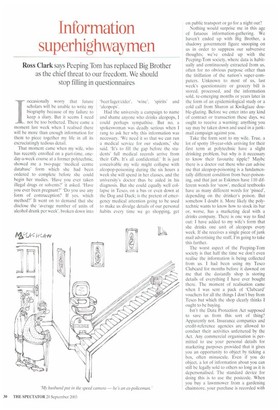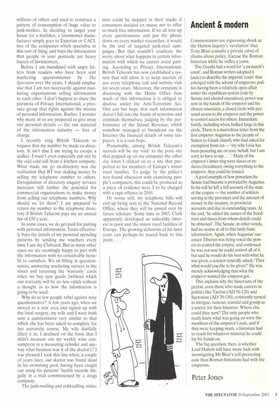Information superhighwaymen
Ross Clark says Peeping Tom has replaced Big Brother as the chief threat to our freedom. We should stop filling in questionnaires
Ioccasionally worry that future scholars will be unable to write my biography because of my failure to keep a diary. But it seems I need
not be too bothered. There came a moment last week when I realised there will be more than enough information for them to piece together my life in all its excruciatingly tedious detail.
That moment came when my wife, who has recently enrolled on a part-time, oneday-a-week course at a former polytechnic, showed me a two-page 'medical centre database' form which she had been ordered to complete before she could begin her studies. 'Have you ever taken illegal drugs or solvents?' it asked. 'Have you ever been pregnant?' 'Do you use any form of contraception? If yes, which method?' It went on to demand that she disclose the 'average number of units of alcohol drunk per week', broken down into 'beer/lager/ciders, `wine', `spirits' and `alcopops'.
Had the university a campaign to name and shame anyone who drinks alcopops. I could perhaps sympathise. But no, a spokeswoman was deadly serious when I rang to ask her why this information was necessary. We need it so that we can run a medical service for our students,' she said. it's to fill the gap before the students' full medical records arrive from their GPs. It's all confidential.' It is just conceivable my wife might collapse with alcopop-poisoning during the six hours a week she will spend in her classes, and the university's doctor thus be aided in his diagnosis. But she could equally well collapse in Tesco, on a bus or even down at the Dog and Duck; is the pretext of emergency medical attention going to be used to make us divulge details of our personal habits every time we go shopping, get
on public transport or go for a night out?
Nothing would surprise me in this age of fatuous information-gathering. We haven't ended up with Big Brother, a shadowy government figure snooping on us in order to suppress our subversive thoughts; we've ended up with the Peeping-Tom society, where data is habitually and continuously extracted from us, often for no obvious purpose other than the titillation of the nation's super-computers. Unknown to most of us, last week's questionnaire or grocery bill is stored, processed, and the information sold, re-emerging months or years later in the form of an epidemiological study or a cold call from Sharon at Kwikglaze double-glazing. Before we enter into any kind of contract or transaction these days, we ought to receive a warning; anything you say may be taken down and used in a junkmail campaign against you.
Take the form sent to my wife. True, a lot of spotty 18-year-olds arriving for their first term at polytechnic have a slight drinking problem, but why is it necessary to know their favourite tipple? Maybe there is a doctor out there who can advise me that alcopop-poisoning is a fundamentally different condition from beer-poisoning, and that just as Eskimos have 110 different words for 'snow', medical textbooks have as many different words for 'pissed', depending on the drinker's poison. But somehow I doubt it. More likely the polytechnic wants to know how to stock its bar or, worse, has a marketing deal with a drinks company. There is one way to find out: I have added to my wife's form that she drinks one unit of alcopops every week. If she receives a single piece of junk mail advertising the stuff, I'm going to take this further.
The worst aspect of the Peeping-Tom society is that half the time we don't even realise the information is being collected from us. I had been using my Tesco Clubcard for months before it dawned on me that the dastardly shop is storing details of everything 1 have ever bought there, The moment of realisation came when I was sent a pack of 'Clubcard' vouchers for all the things I don't buy from Tesco but which the shop clearly thinks I ought to be buying.
Isn't the Data Protection Act supposed to save us from this sort of thing? Apparently not. Insurance companies and credit-reference agencies are allowed to conduct their activities unfettered by the Act. Any commercial organisation is permitted to use your personal details for marketing purposes provided that it gives you an opportunity to object by ticking a box, often minuscule. Even if you do object, a lot of information about you can still be legally sold to others so long as it is depersonalised. The standard device for doing this is to use the postcode. When you buy a lawnmower from a gardening chainstore. your purchase is recorded with
millions of others and used to construct a pattern of consumption of huge value to junk-mailers. In deciding to target your house for a mailshot, a lawnmower manufacturer simply goes to Experian or CAC, two of the companies which specialise in this sort of thing, and buys the information that people in your postcode are heavy buyers of lawnmowers.
Before I am inundated with angry letters from readers who have been sent marketing questionnaires by The Spectator over the years, I should emphasise that I am not necessarily against marketing organisations selling information to each other. I don't happen to share the paranoia of Privacy International, a pressure group that fights against the misuse of personal information. Rather, I wonder why many of us are prepared to give away our personal details — the raw material of the information industry — free of charge.
I recently rang British Telecom to request that my number be made ex-directory. It isn't that I am trying to escape a stalker. I wasn't even especially put out by the odd cold call from a kitchen company. What made me go ex-directory was the realisation that BT was making money by selling my telephone number to others. Deregulation of directory enquiry services increases still further the potential for commercial organisations to make money from selling our telephone numbers. Why should we let them? I am prepared to return my number to the telephone directory if British Telecom pays me an annual fee of £50 a year.
In some cases, we do get paid for parting with personal information. Tesco effectively buys the details of my personal spending patterns by sending me vouchers every time I use my Clubcard. But in many other cases we are seemingly happy to part with the information with no conceivable benefit to ourselves. We sit filling in questionnaires, answering marketing surveys in the street and returning the 'warranty' cards when we buy new goods (without which our warranty will be no less valid) without a thought as to how the information is going to be used.
Why do so few people rebel against nosy questionnaires? A few years ago, when we moved to a new area and signed up with the local surgery, my wife and I were both sent a questionnaire very similar to that which she has been asked to complete for her university course. My wife dutifully filled it in; I declined on the basis that I didn't measure out my weekly wine consumption in a measuring cylinder and anyway what business was it of the doctor's? I was pleased I took this line when, a couple of years later, our doctor was found dead in his swimming pool, having been caught out using his patients' health records illegally in a trial commissioned by a drugs company.
The junk-mailing and cold-calling indus
tries could be stopped in their tracks if consumers decided en masse not to offer so much free information. If we all tore up every questionnaire and put the phone down on every market researcher, it would be the end of targeted junk-mail campaigns. But that wouldn't eradicate the worry about what happens to certain information with which we cannot avoid parting. According to Privacy International, British Telecom has now established a system that will allow it to keep records of our every telephone call and website visit for seven years. Moreover, the company is discussing with the Home Office how much of this information it is obliged to disclose under the Anti-Terrorism Act. One can but hope that such information doesn't fall into the hands of terrorists and criminals themselves; judging by the performance of the Inland Revenue, which somehow managed to broadcast on the Internet the financial details of some taxpayers, it is a vain hope.
Presumably, among British Telecom's records will be my 'visit' to the porn site that popped up on my computer the other day when I clicked on to a site that purported to list members of Europe's minor royal families, To judge by the police's new-found obsession with examining people's computers, this could be produced as a piece of evidence were I to be charged with a rape offence in 2010.
Or worse still, my telephone bills will end up being sent to the National Record Office, where they will be pawed over by future scholars: 'Some time in 2003, Clark apparently developed an unhealthy interest in porn and the minor royal families of Europe. The growing delusions of his later years can perhaps be traced back to this point. . . . '



















































































 Previous page
Previous page